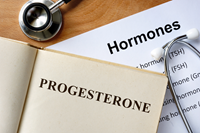From Menarche to Menopause: The Story of Progesterone
The hormone progesterone frequently is discussed with regard to menstruation, fertility, pregnancy, and contraception during reproductive years or in the context of hormone replacement therapy (HRT) with estrogen in menopause. Women, however, often have questions as to the nature of “natural” progesterone as compared with a progestin, which is a synthetic version, or why the route of administration may at times create different reactions, risks, and benefits.
Menopause Transition: Don't Miss This Important Preventative Health Opportunity
Sometime between ages 45 and 55, for many women, gynecologic and related health issues begin to emerge. Menstrual cycles now seem different, mood swings and memory lapses appear, and sleep becomes more chaotic, coupled with warm flushes. And the weight! Why at the mid-section? These irritating acknowledgments belie a more ominous change. During this menopause transition, loosely referred to as “perimenopause,” events are unfolding that have an impact on a woman’s cardiovascular risk.
Let's Talk About Testosterone
Some sports figures have abused it. Many men with “low T” have used it. But most women have been refused it. While over 25 testosterone products in the United States are available to men, for women, there are no FDA-approved testosterone products. For vaginal atrophy and pain with intercourse, only estrogen creams or pills are recommended.
Is There a Window for Menopausal Hormone Replacement Therapy to Help Reduce the Risk of Dementia?
Dementia conjures up many images. As we age, we all worry that the momentary misplaced car keys or the questionable location of the parked car in a large lot may indicate early dementia. In reality, the early signs of dementia are more likely evidenced by putting the car keys in the refrigerator or forgetting how to drive to your familiar home.
Why Is Menopause Management Not Better Understood By OB/GYN Care Providers?
Today, menopause management as a finite field of medicine is a product of many laboratory and clinical studies targeted at understanding the biology of menopause and the impact of hormonal and non-hormonal treatments. Why, then, do women in the menopausal transition or in menopause itself often confront a medical community that is either not aware of or is even indifferent to the challenges they face?





